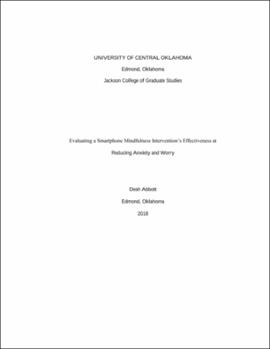| dc.contributor.advisor | Lack, Caleb | |
| dc.contributor.author | Abbott, Deah | |
| dc.date.accessioned | 2020-07-09T14:40:17Z | |
| dc.date.available | 2020-07-09T14:40:17Z | |
| dc.date.issued | 2018 | |
| dc.identifier.other | (AlmaMMSId)9982594285002196 | |
| dc.identifier.uri | https://hdl.handle.net/11244/325076 | |
| dc.description.abstract | There are effective treatments for anxiety and worry symptoms, but there are also many barriers to receiving traditional treatments. A smartphone mindfulness intervention may circumvent many barriers to treatment. This study evaluated the efficacy of a widely used smartphone mindfulness application (app) by randomly assigning participants to either receive access to the app for 8 weeks or to wait for 4 weeks before receiving access to the app for 4 weeks. Anxiety and worry were measured at baseline, 4 weeks, and 8 weeks. It was hypothesized that access to the app for 4 weeks and 8 weeks would be associated with less anxiety relative to the waiting period, with the lowest anxiety and worry at the eight week point. Participants completed a demographic questionnaire, the Beck Anxiety Inventory (BAI), and the Penn State Worry Questionnaire (PSWQ). Participants with moderate to high scores on measures of anxiety were randomly assigned to a treatment group, and completed the measures again four and eight weeks after beginning the study. A series of mixed measure ANOVAs were conducted using an intention to treat last observed carried forward (ITT LOCF) method of analysis. In comparison to the waitlist, anxiety scores decreased significantly both after four and eight weeks of application use. In comparison to the waitlist, worry scores were significantly reduced by the eight week point, but not after only four weeks. This research indicates that this application has a statistically and clinically significant impact on anxiety symptoms in a short amount of time (four weeks), but significant reductions in worry require more time (eight weeks). | |
| dc.rights | All rights reserved by the author, who has granted UCO Chambers Library the non-exclusive right to share this material in its online repositories. Contact UCO Chambers Library's Digital Initiatives Working Group at diwg@uco.edu for the permission policy on the use, reproduction or distribution of this material. | |
| dc.subject.lcsh | Mindfulness-based cognitive therapy | |
| dc.subject.lcsh | Mobile apps | |
| dc.subject.lcsh | Anxiety | |
| dc.subject.lcsh | Worry | |
| dc.title | Evaluating a smartphone mindfulness intervention's effectiveness at reducing anxiety and worry. | |
| dc.type | Academic theses | |
| dc.contributor.committeeMember | Limke, Alicia, 1979- | |
| dc.contributor.committeeMember | Burr, Brandon | |
| dc.contributor.committeeMember | Anderson, Page | |
| dc.thesis.degree | M.A., Psychology | |
| dc.subject.keywords | Anxiety | |
| dc.subject.keywords | Mindfulness | |
| dc.subject.keywords | Randomized trial | |
| dc.subject.keywords | Smartphone | |
| dc.subject.keywords | Technology | |
| dc.subject.keywords | Worry | |
| dc.identifier.oclc | (OCoLC)on1041188006 | |
| uco.group | UCO - Graduate Works and Theses::UCO - Theses | |
| thesis.degree.grantor | Jackson College of Graduate Studies. | |
